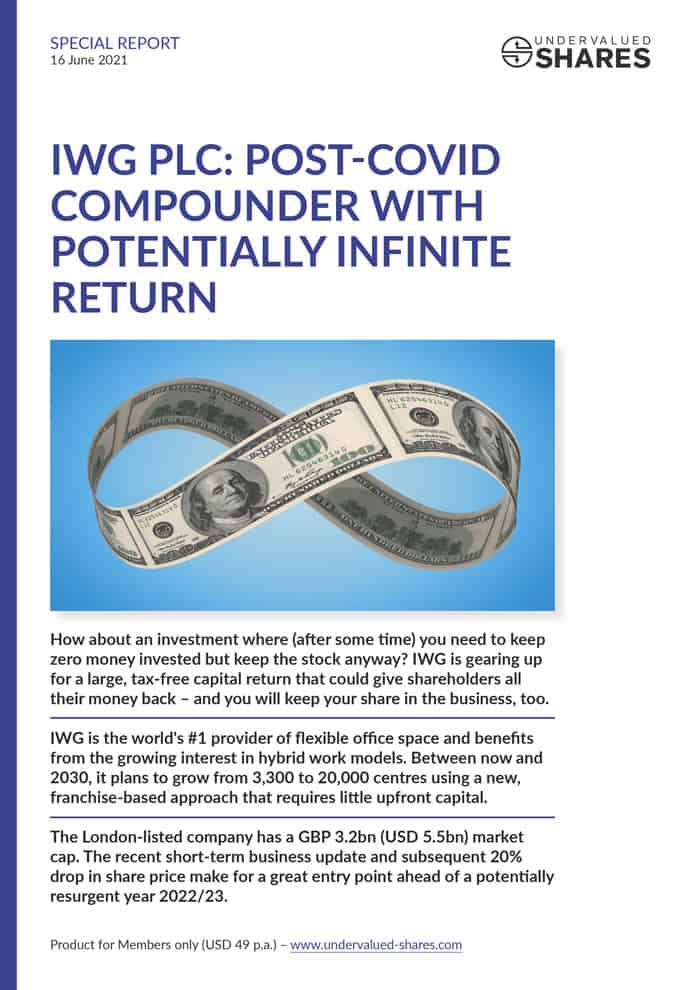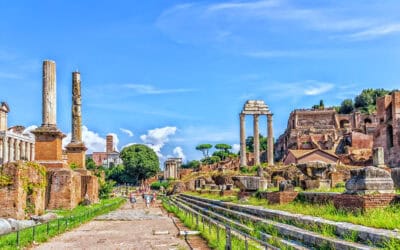Allegedly, just a single photo exists of Nicholas "Nick" Roditi.
Rumour has it that he used to leave work "through the building's car park" and had managed to "not be photographed for about 20 years".
He refuses interviews, even when friends ask him.
The last time a journalist pulled together an in-depth newspaper article about Roditi was in 1996. Since then, the man has been a myth in investment circles.
Yet, Roditi is one of the world's best investors. From 1992 to 2000, his investment fund yielded an average 39% p.a. Since he left Soros Fund Management, Roditi has become a billionaire by investing his own money.
I dealt with Roditi in the early 2000s and have since collected material about him from a broad array of sources. Today's profile brings together this publicly available information. To my knowledge, it's the most in-depth profile currently available about Roditi, and it includes his interests in publicly listed companies.
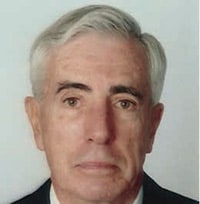
Nick Roditi – the phantom billionaire.
"Britain's highest-paid man"
Virtually no one outside of London's gilded money circles had heard of Roditi before his name started to appear in British media in 1996 and 1997.
During those two years, Roditi had bagged the title of Britain's second-highest paid manager (1996: GBP 52m) and highest-paid manager (1997: GBP 82m), respectively.
At the time, Roditi was working for Soros Fund Management where he managed the Quota Fund, a fund that was launched in 1992 with an initial GBP 160m of client money. Roditi quickly established himself as a genius in making so-called macro bets, i.e. he focussed his investments on countries, asset classes or groups of stocks while placing large bets and leveraging the portfolio. Roditi's record salary during those two years was owed to his investors earning 159% and 82%, respectively, and himself receiving a percentage of the clients' gains as remuneration.
By 1996, the Quota Fund had reportedly grown to GBP 1bn in client assets. According to media reports, investors had to pay a 50% premium to the fund's net asset value to be allowed in. This may or may not have been true. Just like with so much in the world of hedge funds, it was impossible to verify any of this and it could just as well have been floated by a PR agent on behalf of Soros Fund Management.
There is no doubt, though, that Roditi was one of the most successful managers of George Soros' fund management group. Some say he was Soros' best manager besides the much better-known Stanley Druckenmiller.
A native of Zimbabwe (then: Rhodesia), Roditi studied law in South Africa, followed by business at the City University of London. In 1969, he joined a merchant bank, Schroders, where he later helped to start Schroder Securities. Along the way, he first visited Japan and began analysing Japanese securities, which at the time were seriously exotic.
In the 1980s, Roditi started to work for Lord Jacob Rothschild, the English head of the Rothschild family who to this day is famous for his involvement in a number of successful investment businesses, e.g., RIT Capital Partners (ISIN GB0007366395, UK:RCP) and St. James's Place (ISIN GB0007669376, UK:STJL).
However, Rothschild's team reportedly demeaned Roditi during periods when the fund manager got on the wrong side of the markets. Roditi's investment style came with tremendous inbuilt volatility, which simply does not work for most conventional fund management firms. On the other hand, at Soros' firm, "when Nick gets on the wrong side of the markets but thought he was right, George told him to double up", according to a 19 October 1997 article in The Independent. Roditi reportedly became Soros' "most trusted advisor". It seemed that at Soros Fund Management, Roditi had found his natural home – at least for a while.
Among the features usually associated with Roditi's investment style are a concentrated portfolio, the use of leverage, and resulting above-average significant volatility. The 2006/08 book "Hedgehogging" by Barton Biggs contains a four-page chapter about a fund manager called "Tim", who in reality is Nick Roditi. As the book described it:
"Recently, he told me he had three positions. He was short the dollar by a factor of three times his equity, and he had more than 100% of his equity in Japan … In addition, he had 200% of his equity in two-year US Treasury notes as an insurance position. … He uses so much leverage that his results have immense volatility."
In 1998, the risks that come with this style of investing caught up with Roditi. In June 1998, his portfolio was up 32%, but a short five months later it had given up all gain and was down 14%. Roditi was subsequently granted "temporary medical leave of absence" from Soros Fund Management, reportedly because he "had a previous health issue and he has asked to take a rest as a precaution against any recurrence" (The Independent, 27 October 1998). Inevitably, some wondered if the enormous volatility combined with responsibility for a large amount of other peoples' money had taken a physical toll on him.
Roditi left Soros Fund Management in April 2000 when Soros decided to "reorganize his investment group and abandon many of the risky strategies that made him a multibillionaire" (New York Times, 9 June 2000).
Since then, it has become even harder to keep track of Roditi's work. With a bit of effort, though, one can piece together at least a rudimentary image of how he works, learn some important lessons from him, and even follow some of the investments that Roditi is currently involved with.
A low-key base in North London
One of the factoids about Roditi that the British media have been fascinated by and love to repeat is the fact that he doesn't work from London's City or the plush Mayfair district. Instead, his office remained in London's upmarket but mumsy Hampstead neighbourhood – "above a branch of the clothes shop, Gap, with the entrance squeezed between those premises and a Body Shop outlet". Not just that, Roditi also drove a "a far-from-flashy five-year-old Saab".
The British media were so fascinated with Roditi defying the usual successful hedge fund manager stereotype that they had reporters photograph not just his family home with the Saab parked in front of it, but even the doorbell of his office where "his receptionist denies that Mr Roditi works there". Currently, Roditi's UK entities seem to be registered to 2 Back Lane, London, NW3 1HL, which Google Earth shows is a non-descript building in a quiet street just near Hampstead tube station.
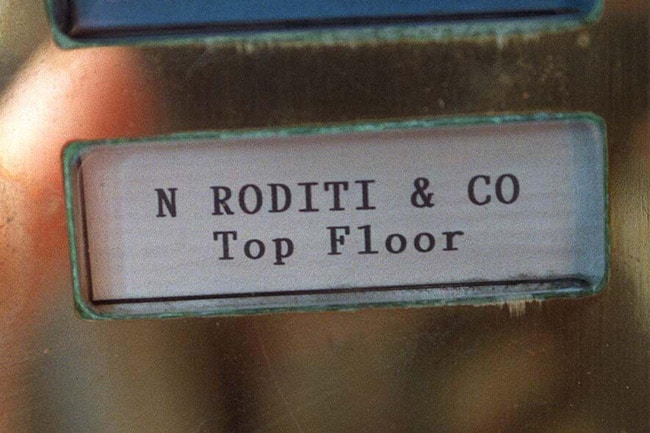
The business Roditi set up in 1992.
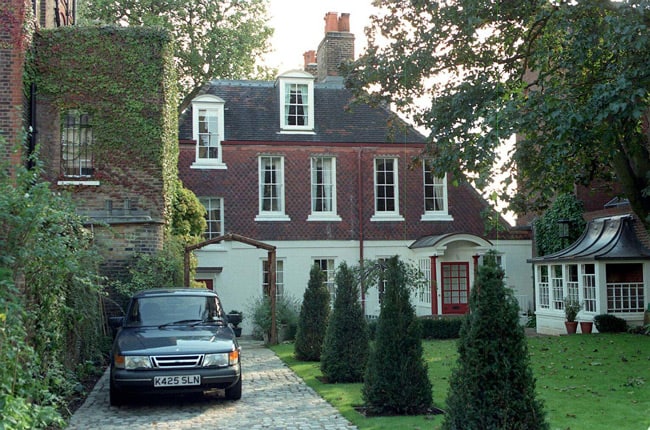
Roditi's family home in Hampstead photographed in 1996.
How much of that is an urban myth and how much of it reality?
Without a doubt, Roditi has always been "a very private person," as confirmed by Shawn Pattison, the public relations officer at Soros Fund Management in the late 1990s in speaking with the New York Times.
Roditi did have to make regular appearances in public, though, when he became major shareholder and director of a publicly listed company in London.
Nasty treatment of shareholders
In 1992, Roditi started to accumulate stock in a tiny London-listed company called Plantation & General Investments. The company operated farms for growing vegetables and flowers in Zambia, a country neighbouring Roditi's native Zimbabwe.
By 1997, he had built a 30% stake and was forced to make a tender offer, which took his stake to 67.8%.
Roditi's love for Africa has been well-known for many years. Besides his base in Hampstead, he owes an estate about 40 miles from Cape Town, South Africa, where "he makes wine from his vineyard and invites fellow tycoons to dinner parties".
Was Plantation & General Investments purely an emotional investment?
I researched Roditi at the time and quickly suspected that he had bigger plans afoot. Indeed, in 2005, Roditi facilitated Plantation & General Investments buying a controlling stake in Jensen Group, a Russian property management firm that raised money from Western investors to invest in high-yielding Russian real estate. Jensen was already managing one property fund, and at the time was in the process of raising USD 150m for a second fund. Roditi supported the fundraising by introducing the right people to the idea.
Smelling an opportunity to buy into a new fund manager at an early stage, I invested in Plantation & General Investments and published a report about it on my then website. The company subsequently changed its name to the more neutral PGI Group, and I felt that it was off to the races. By visiting several of the company's shareholder meetings, I got to meet Roditi and his colleagues.
Sadly, any expectations that PGI Group could turn into a successful fund management company that outside investors can participate in were dashed. Roditi used his majority control of the company to delist the share, which led to a collapse in share price and investors selling in panic ahead of the delisting.
Subsequently, PGI Group launched a section on its website where the remaining shareholders were able to sell their unlisted shares in private transactions. The price at which shareholders who were stuck with an unlisted share could sell was a fraction of the firm's underlying value. Roditi had decided to go private and screw his shareholders in the process.
There was no commercial reason for delisting PGI Group, other than Roditi trying to squeeze out the other shareholders at a low price. At the time, I found Roditi's treatment of investors who had bought into a publicly listed company in good faith entirely detestable – and I still do. I figured that one day, karma might catch up with him.
First, though, Roditi was to become fabulously wealthy.
Roditi's publicly-known investments
According to the Sunday Times Rich List 2021, Roditi's personal wealth has swelled to GBP 2.7bn (USD 3.2bn). In 2005, the same list had put him at just GBP 80m.
Roditi ranked higher on the rich list than well-known British financiers and hedge fund managers such as Chris Hohn (GBP 2.5bn), Peter Hargreaves (GBP 2.4bn), or Sir Michael Hintze (GBP 1.5bn).
Still, as the Sunday Times once more confirmed, Roditi "has remained largely hidden from view in recent years".
When he appears, it's usually because of large stakes that he has to disclose in publicly listed companies:
- Roditi regularly surfaces in reports about Ocado Group (ISIN GB00B3MBS747, UK:OCDO), the GBP 6.2bn (USD 7.5bn) online retailer. Roditi "first invested in the UK online grocer in 2005", i.e. well before its 2010 IPO. Reportedly, he purchased most of his shares for a price well below GBP 1 compared to the current share price of GBP 7.60 (and it traded as high as GBP 28 in January 2021). He appears to have upped his stake along the way through purchases in the market and currently holds 15.14% or 113m shares worth close to GBP 860m (USD 1bn) through The London & Amsterdam Trust Company, his Cayman Islands-registered investment vehicle. The stake was once worth over GBP 3bn (USD 3.6bn) in early 2021, and it's likely that Roditi's net worth will have been negatively affected by the dramatic drop.
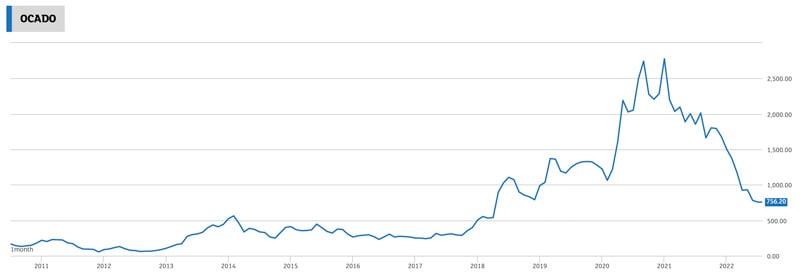
Ocado Group Plc.
- Less noticed is Roditi's large investment in Harworth Group (ISIN GB00BYZJ7G42, UK:HWG), a "property group that specialises in buying old industrial sites, cleaning them up and pushing them through the planning process to be used for homes, warehouses or workplaces" (The Times, 26 September 2021). His investment holding owns 25.18% or 81m shares that are currently worth GBP 130m (USD 160m). Here, too, he is the single biggest shareholder.
- At AO World (ISIN GB00BJTNFH41, UK:AO), a struggling online retailer that is a competitor to Ocado, Roditi was last known to own a 3.63% stake or 17m shares worth GBP 10m (USD 12m). AO World has an interesting shareholder structure involving a hedge fund from Florida, and may be worth a closer look for small-cap sleuths who are after British takeover targets.
- Also less noticed is Roditi's 29.53% stake in Workspace Group (ISIN GB00B67G5X01, UK:WKP), a shared office space provider. His 53m shares are worth over GBP 300m (USD 360m) at current prices. Workspace is a competitor to IWG (ISIN JE00BYVQYS01, UK:IWG), a company that I featured in an in-depth report for Undervalued-Shares.com Members.
How did Roditi amass sufficient wealth to build such stakes, and what can we learn from him?
There is one little-known aspect to his work that ordinary mortals will find impossible to emulate, but there are others that we can all learn from for our own investment strategy.
Living in a world beyond your world
One aspect of Roditi's success that never really seemed to have been discussed anywhere are his outstandingly good connections to the world's rich and powerful.
"It's not what you know. It's who you know." I do believe this old saying has a lot to it!
As far back as the 1990s, Roditi was known to have made large bets in Russia. It probably wasn't to his disadvantage that he had spent years working for someone who allegedly (although never conclusively proven) was instrumental in creating the early class of Russian oligarchs – Lord Jacob Rothschild.
When Mikhail Khodorkovsky, then Russia's richest man with a USD 15bn fortune, was arrested in 2003, "there were reports, later denied, that he (Lord Rothschild) was taking over some or all of the oligarch's holding in the oil company" (Sunday Times, 4 November 2003). No one ever got to know the truth about these alleged dealings, but I remember how at the time, London's finance scene was awash with rumours that Lord Rothschild (and associates) had funded the initial investments of several high-profile oligarchs in the 1990s. As the Sunday Times further reported, "Lord Rothschild's links with Mr Khodorkovsky, and with other Russian oligarchs such as Roman Abramovich, the buyer of Chelsea FC, come through the Open Russia Foundation", which in turns was set up by George Soros, Roditi's employer.
In the early 2000s, Russia's media uncovered that Roditi held a 1.5% stake in Unified Energy System (UES), the Russian electricity monopoly. These shares were worth GBP 600m (USD 720m), though it's unknown whether Roditi held them using personal money or that of investors.
Through his affiliation with Lord Rothschild and George Soros, Roditi will have had access to the very upper echelon of the world's financial elite. Unsurprisingly, this showed up in public records occasionally. As just some examples:
- Steven Wayne, the CEO and founder of the Russian property group merged into Plantation & General Investments, was married to Valerie Rockefeller, the great-great-granddaughter of John D. Rockefeller, the world's richest man of his days and member of America's probably second best-known family dynasty besides the Kennedys.
- Roditi's trusted lieutenant and Chairman at Plantation & General Investments was Rupert Pennant-Rea, a former Deputy Governor of the Bank of England who subsequently became Chairman of The Economist. The chairmanship of the venerable magazine put Pennant-Rea at the very centre of an exclusive club of some of the world's best-connected people.
- The Economist is nowadays controlled primarily by the Agnelli family through their Dutch/Italian investment holding Exor NV (ISIN NL0012059018, IT:EXO). Exor and Roditi were both early investors in Ocado, where they were also joined by the Rausings, the hyper-rich family behind Tetra Pak.
You get the idea.
When I was more present in London's financial circles in the 2000s, I witnessed firsthand how this echelon of people helped each other with access to deals and investment opportunities that ordinary investors could not get in to.
Without wanting to diminish Roditi's analytical capabilities at all, it's probably fair to say that his access to the right people will have contributed to his investment success. This is not an aspect of his strategy that one could emulate.
That said, there are some more accessible traits that were relevant.
What can everyone learn from Roditi?
The best summary of Roditi's winning traits comes from "Hedgehogging", the book mentioned above.
Taking excerpts from this book and a few other public sources, the following five factors seem to have played a significant role in Roditi becoming so wealthy by investing in public markets.
1. Portfolio concentration
"Roditi says: "Diversification is the enemy of investment performance. …
Roditi usually carries about 10 positions, and argues that the proper way to invest for superior performance is to have a few big bets in which you can develop an edge and that you have real conviction in. Then you must follow them intensely. Recently, he told me that he had three positions." (Hedgehogging)
This probably needs no further explanation. (If you do like to read more about the subject of portfolio concentration, check back to my Weekly Dispatch of 13 August 2021: "Concentrated bets – how the world's best value investors got rich".)
2. Leverage
For better or worse, Roditi likes to use a lot of leverage. As Hedgehogging put it, he used "immense leverage".
I personally have mixed feelings about using leverage. For Roditi, though, it seemed to have made a huge difference.
3. Scoping the world for opportunities
Roditi is a man to my heart's content when it comes to taking a global view and travelling in order to research opportunities.
"He studies the world, searching for investment opportunities. … He travels endlessly to places like Japan, Russia, and India, which are not exactly luxury locations. …. On one day in June 2003, when he came by our offices, he was long Japanese banks, Russian equities, Treasury bonds, the euro, and Korean equities. …
He is a very curious, inquisitive man. He operates almost like a secret agent. … He isn't just content with the usual fare of company meetings and government officials in Moscow and St. Petersburg. Instead, because Russia is so much about oil, last year he went on a gruelling trip for a week to Siberia, visiting the Russian oil companies. With the Japanese banks he employs a number of unconventional sources and I know he has long-time contacts with the senior management of two of them. He goes to Tokyo probably four or five times a year."" (Hedgehogging)
During his active years, Roditi reportedly visited over 100 companies each year.
4. Invest long term
When Roditi found a theme that worked, he could stick to it for years: "To get really big long-term returns, you have to … ride your winners." (Hedgehogging)
Roditi also made a brief appearance on page 278 of "Inside the House of Money: Top Hedge Fund Traders on Profiting in the Global Markets", the 2006 book by Steven Drobny:
"Nick Roditi … knows how to find two or three investment themes, take enormous positions, and stick with them for multi-year periods. His intuition for a trend change ….. is unmatched, as is his ability to withstand short-term movements against him."
Nota bene, the ability to stick to an investment for longer was also something that Karl Ehlerding brought up in last week's exclusive interview with Undervalued-Shares.com.
5. Solitary decision-making
"'Running a portfolio', Roditi says, 'is a solitary activity. For me it doesn't work to have partners. In the end, one mind in the dead of night has to make the buy and sell decisions.' Teams, much less groups, are about compromises and they are bound to make less good decisions than an individual who is focused on one portfolio in which his own money is at stake. He says he can and often does make wrong decisions, but at least the decision-making process is uncontaminated. …
Roditi thinks investment management is essentially a one-person, lonely, anguished occupation, and that intense personal relationships with the people who work for you are essentially disruptive and a distraction." (Hedgehogging)
Roditi today
At 76 years of age, not much has been heard or seen of Roditi of late. He has never given a long-form interview to tell his life's story, which is a shame as there'd be many people who'd highly appreciate a chance to benefit from his experience.
Someone who seems to know Roditi well is Raoul Pal, the former macro hedge fund manager and founder of Real Vision. Pal counts people like Stanley Druckenmiller among his interviewees, and he seems to be ideally placed to get Roditi in front of a camera as well.
When asked repeatedly on Twitter if he could interview Roditi on Real Vision, Pal replied:
"Sadly, Nick Roditi is too infirm these days, but he is my investment hero." (Tweet 11 April 2019)
"Ok, I'll ask him again.... he is often here in Cayman but his health isn't great." (Tweet 16 May 2021)
"He won't do it. Begged him." (Tweet 27 September 2021)
In the absence of an interview with Real Vision, I doubt the investment community will ever hear directly from Roditi.
That notwithstanding, as this article has shown, there is more about Roditi in the public domain than is commonly thought. He is probably a good case study of how in the day and age of Google and the electronic surveillance state, virtually no one can remain entirely private anymore.
There are other nuggets of information that pop up on search engines:
- Roditi's personal home in Hampstead? The council of his borough publicly posted a planning application that the Roditis had filed for building a conservatory. The link to the pdf file doesn't work anymore, but Roditi's personal address was available online for years.
- Roditi's personal circumstances? The legislative of the Cayman Islands has published a Cabinet decision to make him a Caymanian. In the Cayman Islands, Roditi's London & Amsterdam Trust Company is a sponsor of the National Gallery.
- Roditi's wife Pamela? Her work with museums in areas such as antique porcelain is the subject of quite a few Internet posts.
- Roditi's son James B. K. Roditi? He has surfaced repeatedly with blogs posts about his travels in Africa and his work in renewable energy.
- Roditi's African agriculture ventures? Like every entrepreneur, even a Nick Roditi has ordinary, unpleasant problems to deal with. A lawsuit filed against PGI Group alleged "'a systemic problem of male workers at plantations abusing their positions of power' to rape, sexually assault, harass and coerce women they supervise into sex", as The Times reported on 28 March 2021. (Maybe these unpleasant problems and the mainstream media coverage that comes with it is the universe paying him back for this treatment of PGI shareholders?)
- Roditi's charitable trust? The Belvedere Trust has to file accounts with the UK's Charity Commission and at last count had over GBP 50m in assets.
- Roditi's early years? Some previously unpublished information surfaced when the City University of London got Roditi to join its global advisory board. For each member, their CV is published online. I have a sense, though, that the chosen picture of Roditi shows him at a rather younger age.
- Roditi's likeness? The same CV also contains a previously unpublished photo of Roditi, besides the rather blurry one that has been circulating on the Internet for the past two decades.
If someone felt like digging further, I am pretty sure there'd be more to be uncovered.
I am sure that my profile of Roditi will contain one or the other factual error, contradiction, or inaccuracy. As with similar publicity-shy characters, the media tend to copy from each other when looking for information – which leads to factoids getting repeated across decades and eventually being taken as truth even if they were never right in the first place.
Also, in the absence of access to the man himself, there is a lot more nuance to many of these points than I am able to relay.
That all said, Roditi is, without a doubt, one of the most fascinating characters of the investment world of the past few decades.
As The Independent put it in 1997: "Chances are that Roditi will remain forever out of reach."
In the absence of Raoul Pal pulling off a miracle, this will likely remain all too true for the remainder of Roditi's life.
Next week: for the third part of my series about the world's best investors, I picked another investor who went from nowhere to billionaire, suffered a massive setback, and then took his wealth to a new record altogether. Once again, I'll analyse what we can learn from him. He is another media-shy personality. Luckily, there is plenty of material for me to work with.
Blog series: The world's best investors
There's more to "The world's best investors" than this Weekly Dispatch. Check out my other articles of this three-part blog series.
Invest in shared office space – like Roditi
Roditi was onto something when he bought a stake in a shared office space provider.
By 2030, the market for flexible office space is expected to grow by about 500% (!).
IWG is the global market leader in this industry and has a 32-year track record as the pioneer for hybrid work models (and made its founder a billionaire along the way).
The company is gearing up for a large, tax-free capital return that could give shareholders all their money back – and you will keep your share in the business, too.
Invest in shared office space – like Roditi
Roditi was onto something when he bought a stake in a shared office space provider.
By 2030, the market for flexible office space is expected to grow by about 500% (!).
IWG is the global market leader in this industry and has a 32-year track record as the pioneer for hybrid work models (and made its founder a billionaire along the way).
The company is gearing up for a large, tax-free capital return that could give shareholders all their money back – and you will keep your share in the business, too.
Did you find this article useful and enjoyable? If you want to read my next articles right when they come out, please sign up to my email list.
Share this post:

